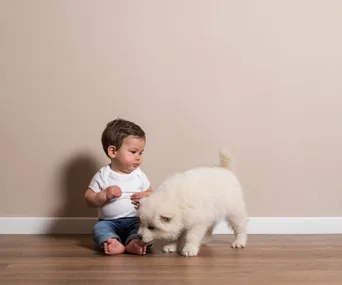Losing sight of your little one, no matter how momentarily, brings a feeling of dread and panic. And if it’s bad for you, imagine how frightening it is for them.
Before you head out, there are a couple of risk management steps you can take to ensure that if your child is separated from you for some reason, you can be reunited as soon as possible.

Some simple steps will help make a frightening situation, a little less so. Image: Getty.
Teach your children your information.
Children, often as young as three, should know your full name (not just mum or dad), and be able to memorise your phone number.
If you have concerns that they won’t remember, and you are heading to a populated area eg holidays or a theme park, write down the information and tuck it away in a secure place such a shoe or pocket and let them know it is there if they need it.
There are also companies who provide disposable ID bracelets with your information that are useful for very young children.
Have a safety plan in place.
There are steps – outlined below – that children should undertake if they get lost. If they do these steps and still can’t find you, having a safety plan in place gives them an ultimate step to do in order to be reunited with their family as quickly as possible.
A safety plan, which ideally you should discuss every time you head out with your children, might be choosing a landmark to meet at, or a specific uniform to look for to ask for help. This will change from place to place, so should be emphasised clearly each time.
Before actioning the safety plan, kids should know to try the following five things first.
WATCH: The incredible way a 10-year-old stopped a kidnapper. Continues after video …
5 things to teach your children to do if they get lost
STOP: If your child has found themselves separated from you or their carer, teach them to immediately stop what they are doing and stand still. Whether they are walking, or playing they should stop what they are doing and give you a moment to come and find them.
BE SAFE: Teach your child to stop and check if they are in a safe place. A safe space is an area where an accident is less likely to happen. If they find themselves in a busy pedestrian path, or in the way of machinery, or traffic, or are close to a large body of water or unstable ground, let them know to move to the nearest safe space and wait.
CALL FOR YOU: Let your children know that they won’t get in trouble for yelling your name if they are lost. Whether they are outdoors or in a library, if they are lost it is OK to stand tall and shout for you in their loudest voice. Teach them to call out your real name, not ‘mummy’ or ‘daddy’. More often than not, you will be closer than they think and can be reunited very quickly.
Sidenote: A child making a loud fuss is less of a target to a predator, who generally target children who can be led away quietly.
LOOK FOR A SAFE ADULT: Statistically, the safest person for your child to approach is a mother with children. Teach your child to look for a mother and child, or another safe adult such as a Police Officer. They should approach them and tell them clearly that they are lost and ask them to call you, using your full name when they do. They can either tell them, or show them your number.
USE THE SAFETY PLAN: If your child can’t identify a safe adult nearby and they have tried all of the above steps and are still lost, now is the time to follow the safety plan you organised earlier.

